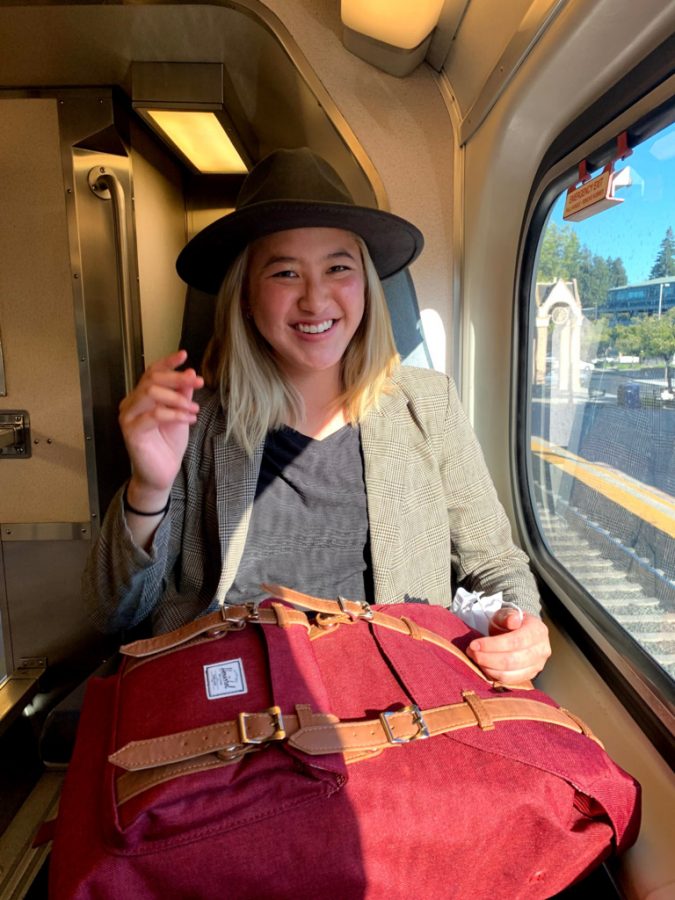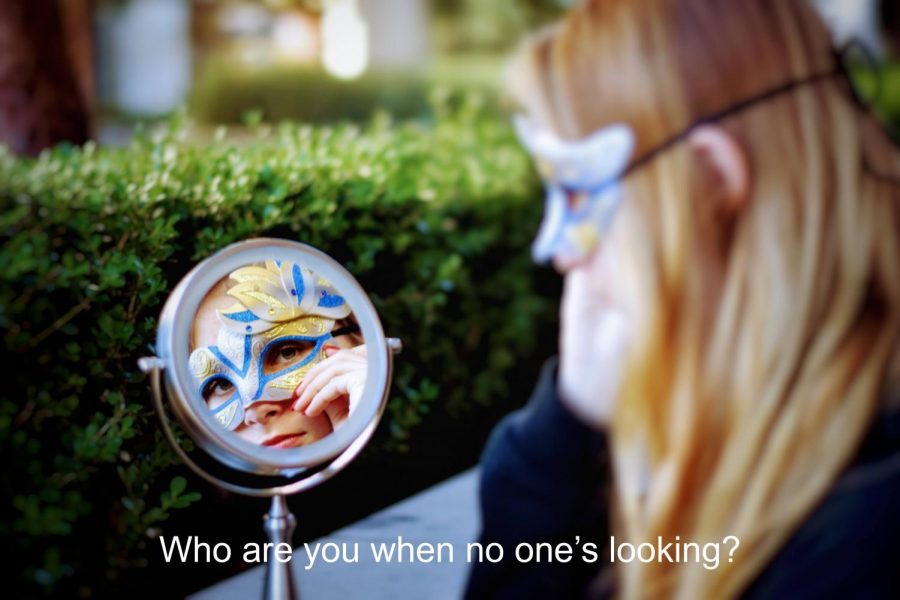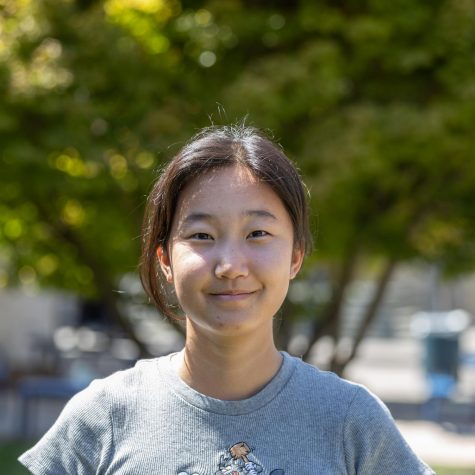LAHS graduate Yao Yao Xiao empowers the deaf community
August 22, 2021
When Yao Yao Xiao arrived in California at age six, the challenges of overcoming a language barrier as a deaf person seemed insurmountable. Now, she’s headed to University of California Santa Barbara as an accomplished photographer, public speaker and advocate for the hearing-impaired community.
When Yao Yao Xiao, Los Altos High School ’21, was young, she would often be astonished by headphone-wearing joggers during the summer; she thought those strange, white wires were meant to protect people from cold. It wasn’t until Xiao put on her first hearing aids that she learned people wore those wires to hear music.
“Okay, so maybe those joggers weren’t so strange after all,” Xiao said in her TED talk filmed by the LAHS TEDx Club in April.
Xiao was born with sensorineural hearing loss, an incurable condition due to nerve damage inside the ear. She can only hear an extremely limited range of sounds, which can be amplified by hearing aids.
Despite the difficulties of public speaking due to her hearing barrier, Xiao delivered a powerful speech on behalf of the deaf community advocating for accessibility. Later, it was uploaded to TEDx Talks, a YouTube channel with 31.6 million subscribers. While her TED Talk is an impressive accomplishment on its own, the resilience behind her many successes is the true start of her story.
Her Journey
Xiao’s journey began in Shanghai, China, where she attended a boarding school for deaf children. When she was 6 years old, her family decided to immigrate to the United States in search of a better chance at equity in education and in life.
However, transitioning to the United States wasn’t easy. On top of the irritatingly bright Californian sun that bothered Xiao when she first came to the United States, she had to cope with a language barrier.
“For me to understand people, I need to adjust to their movements, lip read and filter out background noise,” Xiao said. “[However] no matter how hard I tried to hear in the classroom, I simply could not close the huge gap of verbal communication.”
While there is nothing Xiao could have done about the Californian sun, she said the challenges she faced pushed her to adapt and develop communication strategies for her education and day-to-day interactions. On top of her own fortitude, her family also encouraged her to look beyond her disability and break through those difficulties.
“I had to study for classes weeks or months ahead of time.” Xiao said. “I would preview the fall semester by taking college courses over the summer, so I was able to access audio transcripts from lecture videos.”
As Xiao maintained her resilience throughout high school, she was able to excel in her classes. When she looks back on her time in school and looks to her future, Xiao believes that she has reached her highest potential.
Xiao is currently an incoming freshman at UC Santa Barbara majoring in psychological and brain sciences. She claimed that while part of her reason for choosing pre-med was to satisfy her Asian parents, she is fascinated by the combination of science and the nuance of human perspectives.
“If it weren’t for the people I’ve interacted with in my own journey, I wouldn’t be where I am today.” Xiao said. “Hence in the future, I want to give back. I aspire to work with other people, advocate for them, and also pursue my interest in behavioral neuroscience.
Xiao hopes to capture different perspectives of people in her future, and she is open to different career options that would allow her to do so.
“Humans are complex and nuanced,” Xiao said. “We see through a lens defined by personal experience, upbringing, trauma, relationships, and etc. Writing, creating and photographing are my own creative expressions to tell my story, and the story of other people. [Therefore] who knows? In 10 years, I might end up being a playwright instead.”
Her Superpower
Through her photography, Yao Yao has helped encourage her subjects to overcome insecurities with their bodies.
While Xiao celebrates the differences of people today, she used to fight against her self-consciousness about her disability.
“Everyone in China knew I was deaf,” Xiao said. “But in the U.S., I felt the need to hide it. I was already different. Whenever I got a haircut, I would always ask to have my hair cut into a bob long enough to cover my ears, so I could hide my hearing aids. But even during the haircut, I would take off my hearing aids because I was afraid of what the barber would think if he saw them.”
However, Xiao started to notice the distinct advantages that she possesses. Like she said, people adapt to their sensory losses by making them up in other areas.
“I was more visually observant and could pick up more spatially than most of my classmates,” Xiao said. “It also enhanced my senses when I played sports, which helped me become more aware on and off the field. Additionally, I was able to prove to myself that my hearing impairment did not have any direct affect on how well I can do in school. I found creative ways to learn that other people may not have discovered.
Xiao’s shift in mindset has allowed her to turn what others might perceive as a setback into her own power.
“I began to filter my thoughts from ‘what I miss out’ to ‘what I gained’,” Xiao said. “I saw that my ‘flaw’ was a source of strength, as it had enabled me to be resourceful, intuitive and empathetic. I’m still discovering new ways that my ‘disability’ is giving me everyday.”
After discovering her strengths from the challenges she faced, Xiao found purpose in helping others to overcome their insecurities through photography. During photo sessions with her friends, Xiao often notices their hidden insecurities about their body types and appearances through the way they pose or react to the camera.
“Photography paired very well with my intuitiveness,” Xiao said. “Being deaf has allowed me to be more perceptive about people around me. Because I can’t hear with my ears, I’ve learned to listen with my whole body. I can physically sense if people are uncomfortable through the energy they give off.”
After initially sensing their discomfort in front of the camera, Xiao aims to use her skill to capture her subjects’ advantages and help them regain confidence in themselves.
“My camera helped me capture a new depth of detail [like the] swirls of their irises, and the way I captured that image allowed them to see my perception of them,” Xiao said in reference to a photoshoot of a friend. “The more sessions I had with them, the more I got to see them grow. It’s amazing to fine-tune your own photography skills, but it’s such a different experience to see someone grow in confidence and embody the sensational human being they’ve always been.”
Her Voice
Xiao’s world became filled with confusion during the pandemic as masks prevented her from lip reading others and Zoom classes prevented her from observing the body language of others. As a result, Xiao found herself needing accommodations like captions, which were not available.
“I was not provided captions for the last three months of my junior year and the first three months of my senior year,” Xiao said. “Imagine how many lectures, units or important information I missed during those six months. I could no longer turn to the person sitting next to me for notes during class if I didn’t catch something, or walk up to my teachers after school for support.”
In order to catch up on the content she missed, Xiao had to complete supplementary studying, spending hours drilling her subjects on Khan Academy. When she tried to gain access to the captions of a class from the start of the pandemic, Xiao said her voice was ignored.
“I had to fight for captioning for so long, which is really not okay,” Xiao said. “They just put it on the back burner for over six months. That’s a lot of missed content. It wasn’t something I wasn’t used to, though. It amazes me how much effort I’ve needed to put in all my life.”
From elementary school to high school, Xiao often encountered difficulties when seeking out accommodations. While different types of accommodations were available, Xiao’s requests were often not prioritized by teachers. The pandemic has been a painful reminder for Xiao of the limited accessibility the school and the hearing community has for deaf people.
Instead of staying silent, Xiao chose to speak up for herself and the deaf community. She reached out to the principal, speech therapists, Individualized Educational Plan coordinators and many others to resolve the issue. She even emailed individual companies like Zoom to ask for patented versions of captioning.
“The deaf community is a small one, but we need representation; we need social reform,” Xiao said. “We want to be included in the conversation, literally and figuratively. We live in the Silicon Valley, where progress and innovation are constantly seeing exponential growth. It astounds me how limited technology is for people with disabilities. Think about it: I could change my background on Zoom to have videos of cats, but I couldn’t even access what is being said.”
The good news is that Xiao found out that even though captioning remains a limited market, some companies such as Hamilton Relay, Ave and WebCaptioner are beginning to improve their software to allow for accessibility. In her TED Talk, Xiao urges people to support and advocate for those companies to empower the deaf community.
On top of supporting innovation, Xiao also encourages teachers to understand the importance of maintaining accommodations for deaf students in their classes and taking steps as small as turning on the live transcript every Zoom class.
“Even despite the challenges I’ve endured, I realize that I’m a person of privilege to be in a place where there were financial resources to support me.” Xiao said in her Ted Talk. “It’s my job to use my voice. Individually, I don’t have the power to bring systemic change. But by speaking out here today, we can start something.”



